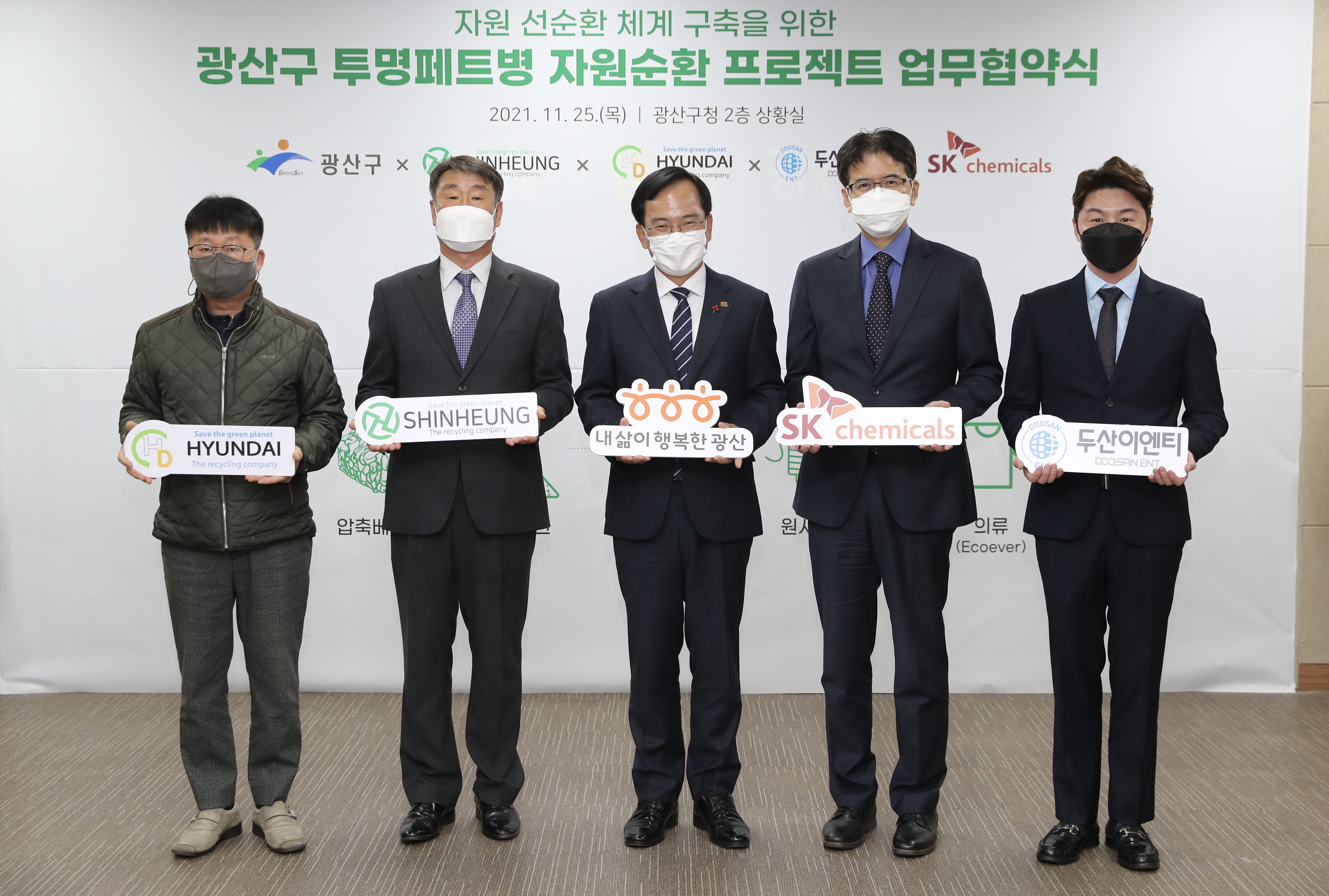- The Gwangsan District in Gwangju becomes the first to establish a resource circulation system in Jeolla Province with local waste collection, sorting, and recycling companies
- 1,000 tons of physically and chemically recycled raw materials will be obtained per year for the production of eco-friendly plastics
SK chemicals will establish its PET bottle recycling ecosystem in Gwangju, following an installation in Gyeonggi Province.
SK chemicals(CEO: Jeon Kwang-hyun) announced on the 25th that the company signed a business agreement for the “Transparent Plastic Bottle Resource Recycling Project.” SK chemicals will separate and recycle transparent PET bottles in cooperation with Gwangsan District, Gwangju and Doosan E&T, Hyundai Environment, and Shinheung Resources.
According to the agreement, the companies and Gwangsan District will promote the recycling of transparent plastic bottles and cooperate in building a resource circulation system that produces eco-friendly products. Shinheung Resources and Hyundai Environment will collect and compress transparent PET bottles disposed of in Gwangsan District and provide them to Doosan E&T, which then processes the bottles into high-quality renewable raw materials and supplies them to SK chemicals. In addition to using this raw material for producing eco-friendly clothing yarn and recycled cosmetic containers, SK chemicals plans to support the production of various upcycled products that reflect Gwangsan District’s unique aspects.
This agreement is the first case in Gwangju and South Jeolla Province, where SK chemicals, local governments, small and medium-sized enterprises, and local companies have joined forces to establish a virtuous cycle system for transparent plastic bottles. Gwangsan District is a large-scale municipality with a population of 420,000. In preparation for expanding the separation of transparent plastic bottles to houses and commercial properties by the end of the year, Gwangsan District's recycling collection and sorting companies and small and medium-sized enterprises specializing in the production of recycled materials have joined to create a public-private partnership.
SK chemicals expects to secure about 1,000 tons of waste plastic bottles per year through this cooperation. The company plans to process high-quality PET bottles into recycled PET (r-PET) and use low-quality PET bottles as raw materials for chemical recycling (depolymerization) through quality classification of secured waste PET bottles. SK chemicals started the world's first commercial production of chemical recycled copolyester last October, and plans to internalize the production technology for chemical recycling of raw materials.
Recycled PET (r-PET) is manufactured by a physical recycling method that consists of finely pulverizing waste plastics and washing, sorting, and mixing processes. Since the physical recycling method only changes the physical shape without changing the chemical structure of the plastic, it is difficult to use contaminated plastic as a raw material via this method. However, the chemical recycling method decomposes plastic, a polymer material, through a chemical reaction and recycles it into the existing raw material form through separation and refining processes. Therefore any waste plastic, regardless of its quality, can be used as a raw material. An SK chemicals official said, “One of the ways to advance to a sustainable society is to build an ecosystem for recycling plastic resources,” and “Through this cooperation, we plan to increase the recycling rate by minimizing PET bottles that are classified as low-quality, incinerated, and landfilled during the sorting process, and expand the value of resource circulation nationwide together with the Gwangsan District.”
Meanwhile, SK chemicals is expanding various external collaborations to build a plastic recycling ecosystem. On the 23rd, Hwaseong and Korea Gyeonggido Co., Ltd. signed a business agreement for collecting and recycling transparent pet bottles using the public delivery app “Special Delivery.”

# Photo: SK chemicals expands its PET bottle recycling ecosystem to Jeolla Province